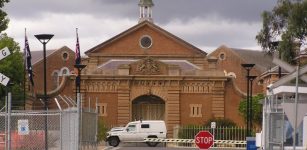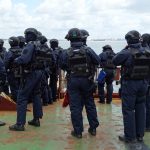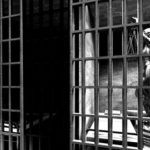Prison for “Radicalised Inmates”: Protecting the Community or Increasing the Threat?

The NSW government announced last Sunday that it will be investing a further $47 million into the state’s correctional facilities in order to “future-proof” the prison system to prepare for a “new era of terrorist inmates.”
The plan includes the construction of a new “mini-max” prison that will be used to detain up to 54 “radicalised” inmates. The new facility, which will be called Supermax II, will be built beside Goulburn’s Supermax prison in the NSW Southern Tablelands. Is this becoming Australia’s toughest prison?
NSW Corrective Services commissioner Peter Severin told reporters outside Silverwater prison on Sunday that the new “mini-me” prison was needed to curb the potential for radicalisation within the NSW prison system in the face of a “significant” rise in inmates on terrorism-related charges.
Since 2013, the number of inmates on terrorism-related charges has more than doubled in the state, with 33 currently behind bars.
The commissioner explained that the idea of the facility is to centralise inmates who have the potential to influence others. At the same time, Mr Severin acknowledged that there is only evidence of four or five inmates having been radicalised within the NSW prison system.
Gearing up for more of the “worst of the worst”
The $47 million package is to be delivered over three years as part of next week’s state budget.
Along with the construction of Supermax II, the funding will be used to set up a new de-radicalisation program and a dedicated six-man counter-terrorism unit based at Silverwater gaol that will cooperate with police.
The package will also fund an overhaul of the Supermax High Risk Management Correctional Centre in Goulburn. The capacity of the facility – which was opened in 2001 – will almost double from 45 to 75 inmates. The work is expected to be completed by the end of next year.
Supermax prisons are designed to detain inmates that are deemed “extreme high risk restricted,” or those that have been given an AA rating. The Goulburn Supermax facility holds notorious backpacker killer Ivan Milat, along with Brothers for Life founder and convicted murderer Bassam Hamzy.
A flawed system
Goulburn Supermax already detains most NSW inmates who’ve been convicted on terrorism charges. These 30-odd prisoners are held together in a group, isolated from the rest of the prison population.
Back in April, this system of holding supposedly “radicalised” inmates together was criticised by ANU criminologist Clarke Jones as being the wrong tactic when trying to de-radicalise these people. He explained that detaining them together has the potential to reinforce their views, further alienate them from society and ultimately creating a greater risk to society when (or if) they are ultimately released.
Over the weekend, Mr Jones also condemned the government’s revised plans to place these prisoners together in a new unit. The counter-terrorism expert recommends that they be dispersed throughout the prison system, which would remove their “strength in numbers”, expose them to a large number of people who do not share – and would likely not tolerate – extreme views, allow them to consider those views and ultimately reduce the risk to society upon their release.
According to Mr Jones, the government’s plans to keep radicalised inmates together is precisely the wrong way to deal with the issue.
Extreme control
According to Mr Severin, the current cells in Supermax were designed to create “more significant communication” between inmates, and are therefore not suitable for radicalised prisoners.
The commissioner that inmates in the new facility will be highly controlled, reducing the opportunity and time to communicate.
He says that inmates will be held in isolation or allowed to mix with just one other prisoner. And they will only be allowed to communicate in English.
The commissioner added that authorities were also looking into why non-Muslim inmates might become radicalised. He then went as far as to imply that some could be tempted into joining the Islamic faith, as Muslim inmates are provided with “additional rations” during Ramadan.
But critics say that such treatment will merely further alienate radicalised inmates, enforcing their perception of being victimised while doing nothing to help change their views. They believe the move will simply produce angry men who are more likely to engage in criminal acts upon their release.
More of the same
The Berejiklian government’s move to budget for further prison beds is a continuation of the “tough on crime” policies the Coalition have been investing in for years.
The state government is already increasing the capacity of NSW correctional facilities by almost 50 percent, announcing last year that it would be spending a further $3.8 billion to fund an extra 7,000 inmate beds over four years.
The money will fund the re-opening of Berrima Correctional Facility and two rapid-build expansions at Wellington and Cessnock prisons. It’s also covering the construction of the Mary Wade Correctional Facility in Lidcombe and the Illawarra Reintegration Centre in Unanderra.
Australia’s biggest prison is also on the cards. Construction is set to begin this year on the privately-run Grafton Correctional Facility, which will have the capacity to detain 1,700 inmates.
“Tough on terror”
“We’ll be making sure we continue to have the toughest position in the nation in relation to reducing and eliminating terrorism activity,” NSW premier Gladys Berejiklian told reporters during the Supermax II press conference.
The premier’s announcement comes after the unveiling of several new measures designed to curb terrorist activity.
The government revealed last month that it would be introducing a number of “tougher and smarter justice reforms,” which include making it harder for offenders deemed to have the “potential for radicalisation” to be released on parole, even if their offence has nothing to do with terrorism at all. The move is certain to target Muslim inmates, many believe unfairly.
And last week, prime minister Malcolm Turnbull outlined a national toughening of parole laws for criminals who are suspected of having terrorist links. He foreshadowed a presumption against granting bail and parole for these inmates..
Premier Berejiklian also announced last week that new “shoot-to-kill” laws will be introduced by the end of this month. Under these measures, police will be given immunity from prosecution if they pre-emptively shoot a person they suspect of terrorism, even if the person isn’t posing an imminent threat to others.
The long war
“The war against terror has another decade or two to go,” NSW corrections minister David Elliot told reporters at Silverwater prison. “So we are preparing for the fact that we may need more capability.”
It’s interesting Mr Elliot has such insight into the timeframe for the war. It’s also important to note that as this nationwide crackdown on terrorism continues to take place, there hasn’t really been any major terrorist incidents in Australia.
As UNSW professor Greg Austin pointed out in the Conversation last October, Australians are far more likely to die in a domestic violence incident than at the hands of terrorists. Over the last two decades, only four Australians have been killed in incidents that could resemble terrorism.
Tragically, two people were killed in the 2014 Martin Place siege, which was perpetrated by Man Monis, who had no links to any terrorist organisation. NSW police accountant Curtis Cheng sadly lost his life when he was shot by a 15-year-old boy, who claimed allegiance to Islamic State.
While 36-year-old Nick Hao was killed last week in Brighton Victoria by Yacqub Khayre during a siege, for which Islamic State reportedly claimed responsibility.








